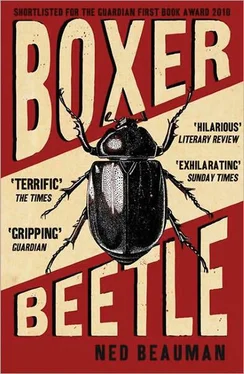By the time William Erskine left Hampshire for Flanders in 1915, a typical room would be connected to the bowels of the house in at least six different ways. You could post your dirty clothes, for instance, through an engraved letterbox inside the wardrobe and they would drop down a chute to the motorised laundry; you could pick up the telephone to speak to a girl at a switchboard who could patch you through to any other room in the house or its grounds; you could plug a nozzle into an outlet in the skirting board and suck a stray moth down into the centralised vacuum pump beneath the scullery. Erskine was also very proud of his pneumatic luggage lifts, ice-making chamber, galvanic baths and motor house. The radical Belgian architectural digest Béton devoted an entire issue to the mechanisation of Claramore, including a well-received essay by its master in which he argued that only the worship of science could avert the dark tidings of Spengler’s The Decline of the West .
But by the time William Erskine left Flanders for Hampshire in 1918, he had seen a man’s legs crushed to paste by the treads of a tank, and worse besides; so although in public he argued that the war had vindicated beyond question his belief that nothing was now more important than technology, he couldn’t prevent a certain cowardly ambivalence creeping into his private opinions. Also, during his absence, there had been problems at Claramore. By some mischance, for instance, the steam turbines in the power room and the hydro-extractor in the laundry resonated at the same electrical frequency, like a Tesla coil, so that when they were both running at full pelt the narrow corridor between them would sometimes crackle with arcs of lightning, jolting the cardiac muscle of any maid who happened to be carrying a silver jug or candlestick. Clothes sent down to be washed would be sent back up two or three weeks later, usually to the wrong room, perfectly spotless but also ripped at the seams and stinking of petrol, with the result that guests began to hoard their muddy riding breeches under their beds. One male visitor had to be driven to hospital after an accident with a vacuum nozzle that was never satisfactorily explained. William Erskine was willing to ignore all this, but then one day in 1919 his favourite footman was electrocuted by the plug chain of a galvanic bath, and suddenly, just as his father once had, he lost all interest in the details of Claramore’s functioning, leaving his wife to take charge of a house which now needed an additional cadre of servants merely to compensate for the erratic behaviour of its machines.
At only one other time in his life did William Erskine feel a spasm of optimism about the automated future. In the same week in 1928 that his son went up to Cambridge, he read in The Times that several companies were now manufacturing ‘brass brains’, the sophisticated progeny of the tide-predicting machine he had observed sixteen years earlier. Temporarily gripped by exactly the ardour that had first inspired the reinvention of Claramore, he sold some stocks and paid for a top-of-the-range brass brain to be shipped over from Binghampton, New York and installed in the library. For several months thereafter William Erskine seemed to have an endless supply of arithmetical problems that urgently needed solving, often during dinner or in the middle of the night, and the house would vibrate for hours at a time with the grinding of the beast’s polished teeth. (The library was no longer a very popular place to sit and read.) He went as far as sacking his estate manager, presuming that he basically just did a lot of sums, and a short while later was forced to write a curt note to his wife asking her to rehire the old man. His entire personality somehow rejuvenated by his purchase, he would now often ask Philip and Evelyn what they and their friends got up to for fun, embarrassing them by chuckling complicitly over even the tamest jokes and stories. But the effect couldn’t last for ever, and before long William Erskine was back to his gruff old self, with the result that there was no one there to take the slightest pleasure in Claramore’s machines until the arrival some seven years later of Amadeo Amadeo, one of the guests at the conference of fascists, who had read the original report in Béton and was now beside himself with exultation to be caressing with his own hand the house’s famous centralised vacuum pump.
‘So very superior to those puny little portable models they have these days,’ said Amadeo over the roar of the pump. ‘With this one you could suck the clouds out of the sky.’
‘Er, quite,’ said Philip Erskine.
Sinner had driven the car up from London that afternoon. By the fourth or fifth time the boy swerved merrily into the wrong lane or nudged a cyclist into a ditch as he overtook, Erskine was convinced that Sinner was doing it deliberately to frighten him; but although he wasn’t sure that either he or the car would ever quite recover from the ordeal, he could not deny that they had made astonishingly good time, arriving quite early in the afternoon to find his mother standing on the lawn in front of the house talking to a xanthomelanous gentleman in a bright yellow suit of a radically asymmetrical cut, seemingly made of some sort of shiny wrapping paper, fastened by just one large steel button halfway down the jacket.
Sinner parked near the stone griffins and they got out. Erskine’s mother came over. ‘Darling! You’re here. And who is this?’
‘Hello, mother. This is just my valet, Roach.’
Sinner doffed his cap in the way that Erskine had insisted he practise. In his waistcoat, stiff collar and pressed trousers he looked quite respectable — comically so to Erskine, who had taken some satisfaction in picking out the clothes.
‘You’ve brought your own valet with you to visit the house you grew up in?’
‘Yes.’
‘That’s a pity. I was expecting my son, not Prince Francis Joseph of Battenberg, but I suppose we shall have to muddle through.’ She embraced him, and then quietly added, ‘Isn’t he a bit … I mean, what does he do if he needs to reach something on a high shelf?’
‘He’s an excellent valet.’
‘Very well, then.’ Philip Erskine, it will be possible to deduce by now, had not been an easy child to raise, and his mother assumed that he had finally found a manservant who knew how to deal with his absurd squeamishness and pickiness. She herself was not at all like her son. Very beautiful as a debutante, and indifferent to politics except when she wanted to justify her large donations to the poor, she had realised soon after her wedding that she hadn’t married a man so much as married a house — a house which, even before the slow dwindling of the Erskine family’s income and even before the damned machines, had been known for hatching troubles at a rate disproportionate to its moderate size. And at first it had all felt utterly impossible, but by now she quite enjoyed herself and sometimes wondered whether, after her husband died, she could go and manage one of the great European hotels.
Her son, for his part, liked his mother, but there were still various obstacles to a warm relationship between the two, not the least of which was his secret disgust at the very notion of family resemblance. Whenever he saw a pair of relations who looked very much alike, each face seemed to stand in relation to the other as the smell of rotten fruit does to the smell of fresh fruit, or as a caricature does to a photograph, the copy exposing the latent ugliness of the original. He hated to catch himself and his mother or father or sister reflected in a mirror. Just then, Sinner was no doubt looking at the two Erskines and thinking that Philip looked like a grotesque masculinoid parody of his mother while his mother looked like a grotesque feminoid parody of Philip.
Читать дальше











